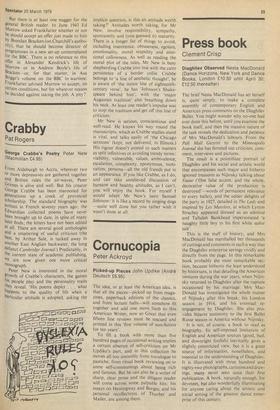Crabby
at Rogers
George Crabbe's Poetry Peter New (Macmillan £4.95)
From Aldeburgh to Accra, wherever two or more depressives are gathered together and Britten rules the air-waves, Peter Grimes is alive and well. But his creator George Crabbe has been marooned for generations up a creek of provincial scholarship. The standard biography was written in French seventy years ago; the Edwardian collected poems have never been brought up to date, in spite of many later finds; the letters have not been edited at all. There are several good anthologies and a smattering of useful criticism (the best, by Arthur Sale, is tucked away in another East Anglian backwater, the long defunct Cambridge Journal.) Predictably, in the current state of academic publishing, We are now given one more critical Monograph.
Peter New is interested in the moral growth of Crabbe's characters, the games 1-1,Is People play and the personality traits ,tney reveal. 'His poems depict . . . what naPpens to the quality of life when a Particular attitude is adopted, asking the
implicit question, is this an attitude worth taking?' Attitudes worth taking, for Mr New, involve responsibility, sympathy, spontaneity and (you guessed it) maturity. There is a longer list of things to avoid, including insentience, obtuseness, egoism, emotionality, moral stupidity and emotional callowness. As well as reading the moral plot of the tales, Mr New is busy shepherding Crabbe into line with the calm persistence of a border collie. Crabbe belongs to 'a line of aesthetic thought', he is aware of 'the minor line of eighteenthcentury verse', he has 'Johnson's Shakespeare behind him', with the 'major Augustan tradition' also breathing down his neck. At least one reader's impulse was to stop the tradition and get off this line of criticism.
Mr New is serious, conscientious and well-read. He knows his way round the manuscripts, which as Crabbe studies stand is vital, and talks easily of 'the Chicago sermons' (kept, not delivered, in Illinois.) His rigour doesn't extend to such matters as split infinitives or avoiding trendy terms: viability, vulnerable, values, ambivalence, escalation, complexity, eponymous, motivation, persona—all the old friends put in an appearance. If you like Crabbe, as 1 do, and can take unrelieved discussion of humane and healthy attitudes, as I can't, you will enjoy the book. For myself I would adapt Mr New's hero Samuel Johnson: it is like a record by singing dogs —quite well done but you rather wish it wasn't done at all.


































 Previous page
Previous page